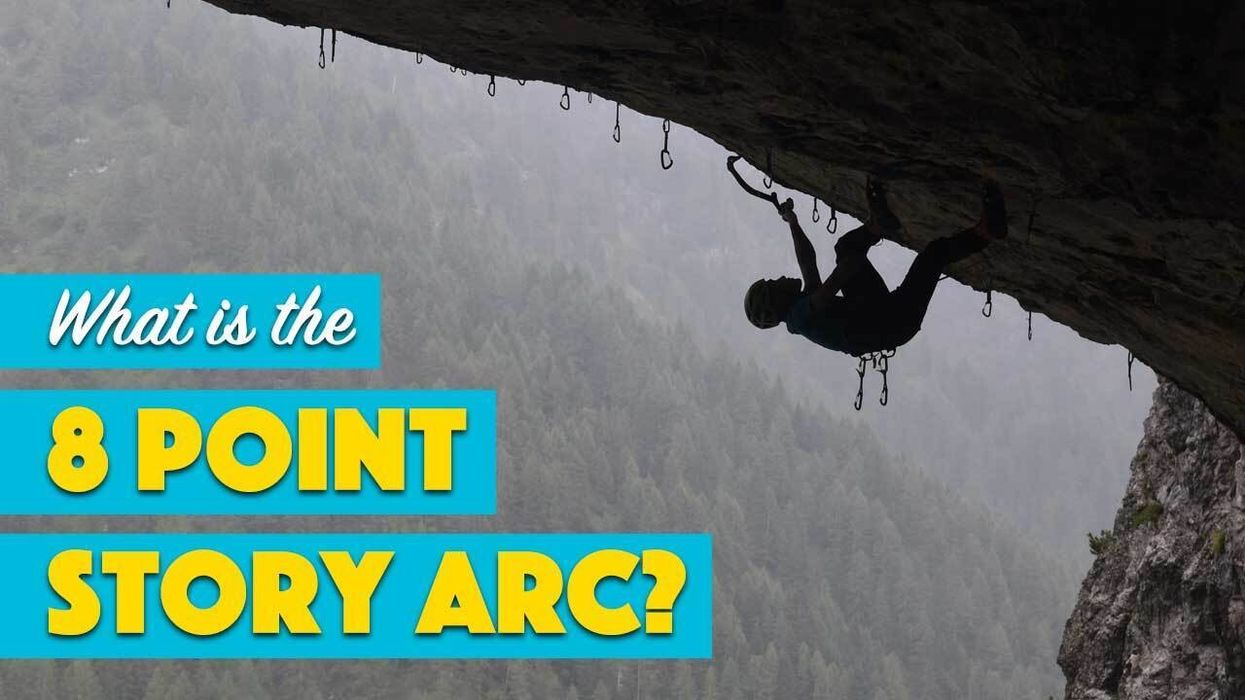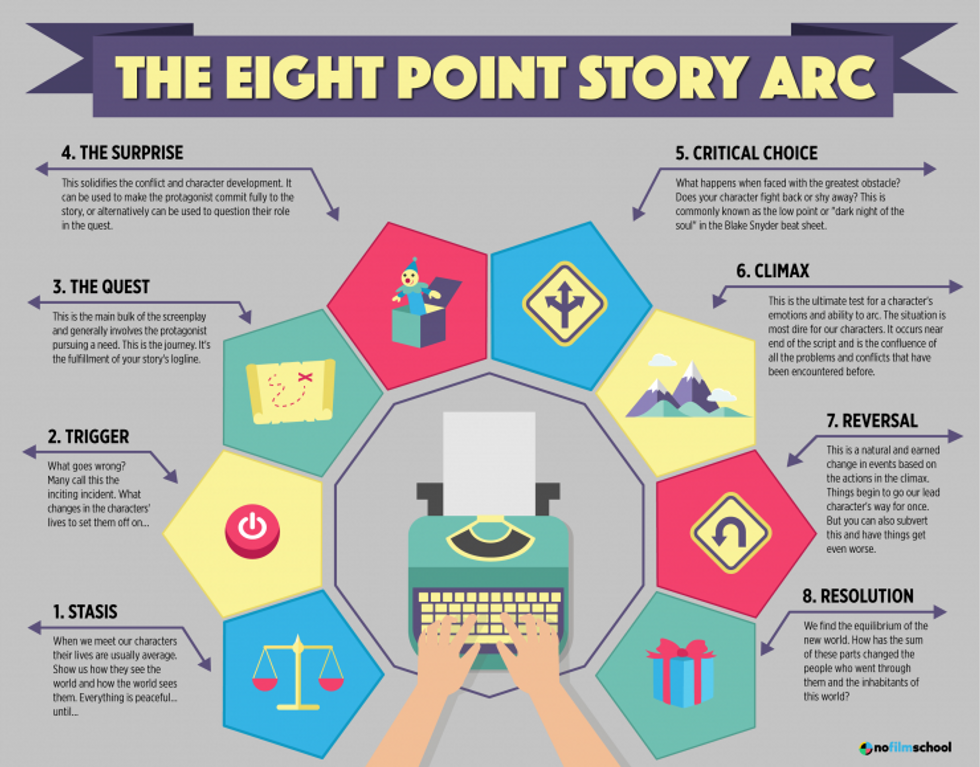What is the 8-Point Story Arc?
There are many techniques to writing. So where does the 8-point arc come into play?

When I sit down to write, it's kind of a slog. I try to build out my idea as best I can from logline to outline, but eventually I just have to sit and write the idea out. I like to be as prepared as I can, so I am always looking to see if there are any tips or tricks that let me see story in a new light.
That's why I was so happy to find this "8-point arc."
It's a tool that allows you to track the plot and characters over the course of your story.
Today, I want to take you through this idea and show how it applies to write movies. We'll look at some examples and even have a template for you to use for your own projects.
Sound good?
Let's dive right into the work.
What is the 8-Point Story Arc?
Before we begin, I should clarify that the 8-Point Arc is not 3-Act Structure. Sure, your 8 points can be bent into that structure later, but think of these as story markers, moments when you need to link character and plot. They are the emotional arcs that take the audience into your story and bring them from beginning to end.
The 8-Point Arc is one of many plot structures and has its origins in another teach-yourself book Write a Novel And Get It Published by Nigel Watts. But I think it's easily applicable to screenwriting, so I wanted to present it to you and analyze how it fits into writing movies.
What are the 8 Points?
The 8 points are moments that should occur in the telling of a story. Do they have to occur? No. Again, this is all subjective and a tool to get your mind moving. No matter what happens in each of these 8 points, make sure your work reflects both character and plot.
Let's go through the 8 points and their specific meaning in the story.
1. Stasis
When we meet our characters their lives are usually average. Show us how they see the world and how the world sees them. Everything is peaceful...until...
2. Trigger
What goes wrong? Many call this the inciting incident. What changes in the characters' lives to set them off on...
3. The Quest
This is the main bulk of the screenplay and generally involves the protagonist pursuing a need. This is the journey. It's the fulfillment of your story's logline.
4. The Surprise
This solidifies the conflict and character development. It can be used to make the protagonist commit fully to the story, or alternatively can be used to question their role in the quest.
5. Critical Choice
What happens when faced with the greatest obstacle? Does your character fight back or shy away? This is commonly known as the low point or "dark night of the soul" in the Blake Snyder beat sheet.
6. Climax
This is the ultimate test for a character's emotions and ability to arc. The situation is most dire for our characters. It occurs near the end of the script and is the confluence of all the problems and conflicts that have been encountered before.
7. Reversal
This is a natural and earned change in events based on the actions in the climax. Things begin to go our lead character's way for once. but you can also subvert this and have things get even worse.
8. Resolution
We find the equilibrium of the new world. How has the sum of these parts changed the people who went through them and the inhabitants of this world?
The 8-Point Arc Examples
Now that you know the basics, let's cover some examples in film that really bolster our understanding of the beats themselves.
Stasis
I like to think about stasis as everything that happens in the shire in the first Lord of the Rings movie. It's a place where we see the average life of average people. Little do they know that things are about to change, but we get to engage with them on a level that gets us ready for the difference moving forward.
Trigger
Whether it's big or small, this is the thing that changed the world. In something like Gone Girl, it's the very idea that Amy is missing. Everything goes from bad to worse. Nick calls for the cops and then his whole life gets turned upside down as the hills are scoured for evidence and clues of her whereabouts.
The Quest
Why are we in theaters (hopefully) to see this movie? What are the moments in the trailer that we see here? This is the main thrust, so in a movie like Good Will Hunting, it's seeing this salty janitor take on his therapist while dealing with being so good at math. It's the meat of his journey.
The Surprise
I liken this to the midpoint. What changes the course of events for the protagonist? In a movie like Alien, it actually changes the genre too, from science fiction to horror. When we have the alien pop out of someone's chest, nothing is the same on that ship after that.
Critical Choice
Can your character overcome their hardest obstacle? Sure, it's easy to pick out battles like Helm's Deep for physical hurdles, but I think the "I can't beat it" scene from Manchester by the Sea is one of the most poignant pieces of filmmaking ever. It shows a character facing down everything and knowing there is no way to win, but in agreeing on that fact, he finds a way forward.
Climax
This is where it all comes to a head. Where all points lead. Your characters must have a showdown with what has come before. It is the plot payoff and also the emotional one. In a movie like A History of Violence, our protagonist needs to finally confront where he came from. To kill everyone so they stop seeking him out and ruining the life he has built.
Reversal
Will things go your way finally? It's up to you as the writer, but this needs to be the payoff of the climax. In something like Scream 4, we get a play on this very plot point. We think it's over, that the killer is dead and Sidney will always be our final girl...until...the killer strikes again.
Resolution
Where does our story end? How are things summing up for the characters and the world? What has changed since we visited stasis? If you pick a movie like Unbreakable, our ending is that he's going to go out and be a superhero. It fulfills the promise of the premise, but we also get the true ending of two characters getting the answers they want. There are superheroes in the world, and there are supervillains as well.
What's next? Get our free screenwriting eBook!
So much of what we're talking about on No Film School when it comes to screenwriting is summarized in our new eBook. It also helps guide you through a 10-week writing plan that will get your script actually finished.
- Try Our Screenplay Beat Sheet (Free Template) ›
- The 6 Emotional Arcs of Storytelling, Why You Should Use Them, and Which One is Best ›
- Midpoint Reversal Explained ›
- 5 Screenwriting Lessons From the 'Good Will Hunting' Script | No Film School ›
- A Guide to Special Formatting Circumstances in Screenplays | No Film School ›












